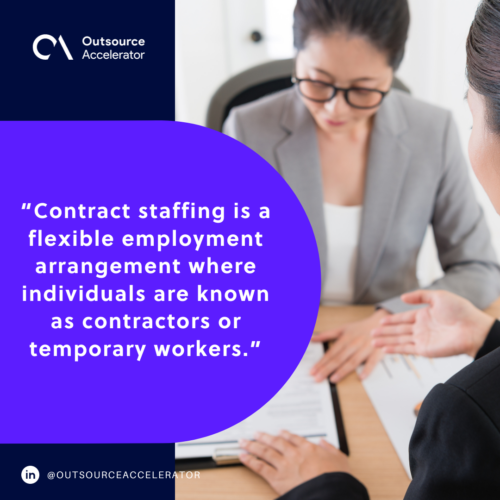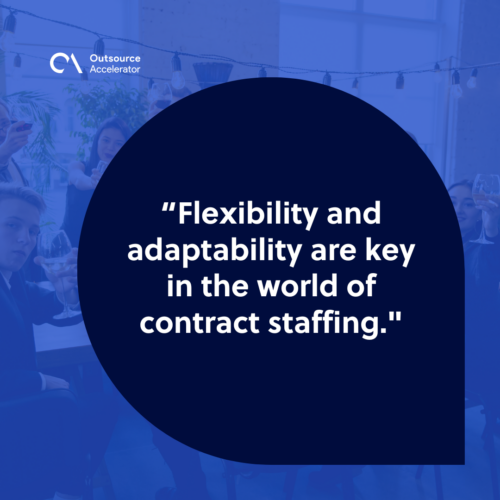Getting started with contract staffing

Companies seek flexible staffing solutions that adapt to their needs without the constraints of traditional hiring models. It is where contract staffing emerges as a powerful ally.
But what exactly is it?
This article explores contract staffing, its advantages, and how to kickstart the process.
What is contract staffing?
Contract staffing is a flexible employment arrangement where individuals are known as contractors or temporary workers. A company hires them for a specific period, task, or project.
Contract roles provide a defined duration of service without the long-term commitment of permanent employment.

Types of contract staffing
Here are the various types of contracts, each offering its unique advantages and nuances:
Temporary contract
Temporary contracts address short-term needs. It caters to projects with fluctuating workloads or covering staff absences.
This contract offers flexibility without the commitment of permanent positions.
Fixed-term contract
Fixed-term contracts provide a set duration of employment. This contract is ideal for projects with specific timelines or phases. It offers clarity and structure in project-based work.
Freelance contract
Freelance contracts embody the gig economy. It allows individuals to offer expertise across various projects, often remotely.
This kind of contract provides flexibility for both parties involved.
Contract-to-hire
Contract-to-hire agreements allow companies to assess an individual’s fit for a permanent role during a specified contract period.
It serves as a trial period before offering a permanent position.
Part-time contract
Part-time contracts cater to roles requiring specialized skills for limited hours. This contract strikes a balance between full-time commitments and project-specific needs.
Zero-hour contracts
Zero-hour contracts offer flexibility by allowing employees to work when needed. This agreement is suitable for individuals who appreciate having unpredictable work schedules.
Consulting agreements
Consulting agreements involve hiring specialized experts or consultants for advisory roles or project-based work. This contract taps into niche expertise for specific needs within a company.
Advantages of contract staffing
Below are the top advantages that make contract staffing a game-changer:
Flexibility and cost-effectiveness
Contract staffing offers unparalleled flexibility. The companies can scale their workforce according to project needs.
It’s a cost-effective solution enabling agile responses to fluctuating workloads.
Overcoming geographical limitations
Contract staffing breaks down geographical barriers by letting companies hire specialized skills regardless of location.
This advantage provides access to a diverse talent pool from around the world.
Access to specialized skills
Contract staffing ensures access to a dynamic talent pool, offering specialized skills precisely when needed. Companies can tap into expertise tailored to specific projects, enhancing productivity and innovation.
Reduced administrative burden
Companies streamline administrative tasks associated with payroll, benefits, and taxes by engaging contract workers.
Reducing administrative overhead allows businesses to focus more on core operations and project execution.
How to get started with contract staffing
Getting started in contract staffing requires a step-by-step guide need to consider.
1. Define your needs
Before beginning contract staffing, you must know exactly what your project requires.
First, figure out the key skills you need for success. How long will your project last? This plan sets the direction for finding the right talent.
If you’re launching a short-term marketing campaign, you might need individuals with expertise in digital marketing, content creation, and social media management.
2. Develop a job description
Crafting a captivating job description is like creating a detailed role image. You want candidates to see themselves as essential to your project. List the duties, skills needed, and what you expect.
For example, if you need a graphic designer, be clear about needing someone who can turn ideas into amazing visuals. Mention the software skills and the artistic style you’re after.
3. Explore contract staffing agencies
Contract staffing agencies are like superheroes in talent recruitment. They’re experts at linking businesses with talented pros, making hiring easier.
Look for trusted agencies in your industry—they hold a goldmine of skilled individuals.
For instance, XYZ Staffing Solutions excels in linking tech firms with seasoned developers for quick projects.
4. Use network and utilize platforms
Never underestimate the power of your professional network and online platforms. Your next star performer might be a connection away.
Leverage platforms like LinkedIn, where professionals actively seek opportunities. Join relevant groups, participate in discussions, and broadcast your project requirements.
Post a concise version of your job description on LinkedIn, and watch as connections share it within their networks.
5. Clear contract terms
Ensure your contract terms are crystal clear, covering every collaboration aspect. Outline responsibilities, timelines, compensation structures, and any other relevant details.
A clear agreement sets the stage for a smooth and successful partnership.
Specify the project start and end dates, payment terms, and any specific milestones that trigger additional compensation.
6. Interview and assess candidates
The interview process is your opportunity to delve deeper into a candidate’s skills, experience, and cultural fit.
Craft thoughtful interview questions that go beyond the resume. Assess technical capabilities and interpersonal skills that align with your projects.
You may ask candidates about their experience handling tight deadlines or their approach to collaborating with remote teams.
7. Provide necessary support
Once you’ve onboarded your contracted talent, provide the necessary support for them to excel.
Ensure they have access to essential resources, training, and any tools required for the project.
A well-supported contractor is a motivated and productive one.
For example, if your project involves specialized software, offer training sessions or provide access to online tutorials to enhance their proficiency.
8. Maintain communication
Establish a communication that suits both parties. Your may perform regular check-ins, project updates, and an open-door policy.
Consider having weekly virtual meetings to discuss progress, address concerns, and celebrate achievements. Maintain an open channel for receiving feedback and making necessary adjustments.
9. Compliance and legal considerations
Stay abreast of labor laws and regulations to ensure compliance. This step protects both your company and the contracted talent.
You have the option to consult legal professionals to create contracts aligning with local employment laws and industry standards.
10. Evaluate and adjust
The contract staffing journey doesn’t end with onboarding. Continuously evaluate the collaboration, seeking areas of improvement.
Gather feedback from both parties and be willing to adjust your strategies for optimal outcomes. Flexibility and adaptability are key in the world of contract staffing.
If you notice a specific skill gap in your team, consider adjusting your recruitment strategy for future projects.
Recruit and hire using contract staffing
Recruiting and hiring through contract staffing isn’t just a hiring tactic – it’s a strategic approach to reshaping how companies assemble their teams.
It’s about embracing flexibility, harnessing specialized skills, and redefining the traditional hiring model.








 Independent
Independent




